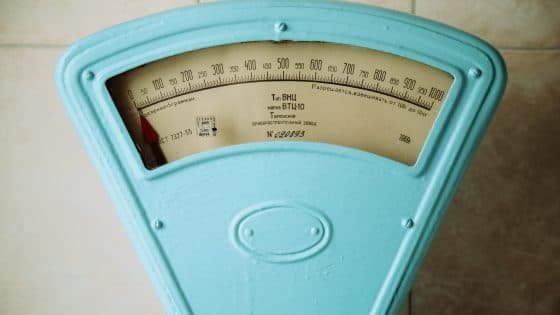What’s The Deal With Menopause Weight Gain?

The menopause can throw all manner of questions for those of us who are just experiencing it, or have yet to – not least the possibility of menopause weight gain and dry skin While common side-effects include hot flashes, reduced libido, night sweats and anxiety, menopause and weight gain are also strongly linked.
Some of us experience menopause weight gain from as young as our early-40s if we are perimenopausal, while others can notice it right until the end of our menopause when we’re in our 50s. So why do we experience weight gain during menopause and what can we do about it? Read on for more information and some handy advice…
What Is Menopause Weight Gain?
If you find yourself nodding along to the above in recognition, then you’re not alone. Whether it’s perimenopausal weight gain or post menopause weight gain it’s something that affects many of us around this particular life stage. Weight gain during the menopause is completely natural and is our body’s response to the hormonal shifts that occur. Naturally, as our hormones shift, our body changes, and one of these changes can be weight gain.
What causes menopause weight gain?
So what causes us to gain weight during the menopause? Registered nutritionist
“Your basal metabolic rate (BMR) is the energy you need to simply stay alive: to breathe, to keep your heart beating, to circulate blood – many of us know this as our ‘metabolism’,” she explains. “We used to think metabolism slowed down during menopause but a recent study showed it actually doesn’t decline until our 60s and even then it’s a fairly insignificant change. So we can’t blame it on that.”

So what else could be the culprit? “Many of us unwittingly become more sedentary during midlife,” Bardwell notes. “Hormonal fluctuations mean we’re often fatigued and in turn, our appetite increases and our desire to exercise becomes blunted, which affects the amount of energy (or body fat) we burn.”
But that isn’t the end of the story. “On top of that, fat cells produce small amounts of oestrogen, which of course your body wants to hang on to during perimenopause at all costs – so it seems much harder than ever before to deal with menopause weight gain ,” she continues.
“Add stress into the mix, some genetics, plus a potential loss of insulin sensitivity as you age and you have the perfect storm for weight gain during the menopause.” So now you know what causes weight gain during menopause, what can we do to prevent it?
How Can I Stop Menopause Weight Gain?
The solution to menopause weight gain might not be as straight-forward as you might think. “Trying to lose weight by focusing on food is like trying to quit drinking by focusing on alcohol,” says Bardwell. “In the clinic the best results occur when women look at their eating habits and behaviours, rather than purely focusing on calories.”
She continues, “When I work with clients we start by putting everything they eat under a microscope and deciding what can be tweaked. Small changes get results but it’s important to be realistic. We want consistency, not perfection and nothing changes overnight – quick fixes rarely create long-lasting weight loss,” she warns.
“You can follow a similar process yourself by using calorie tracking app or simply keeping a food diary and noting down what you consume each day for a week and looking at patterns of eating behaviours that come up. I have a whole chapter in my book The
According to the
“During the menopause, muscle mass reduces which means that you may need fewer calories. Over time this can lead to weight gain. Resistance activities, such as using weights, are especially important to both preserve and build muscle mass. [Whilst] thirty minutes of fast walking a day can also help with weight loss, and also reduce the risk of heart disease.”
And you can help increase muscle mass – as well as control those hunger pangs – by adding protein into your diet. “One of the most important is to make sure you’re eating a palm-sized piece of protein with every meal, including breakfast. Think Greek yoghurt, eggs, tofu, chicken, fish and beans,” Bardwell advises. “Protein fills you up, helps prevent cravings, keeps your blood sugar levels nice and steady throughout the day and helps with building muscle.”
For Karen Tippett, Founder of
“So many aspects of menopause feel like you have little control and as life goes on around you, it can feel very isolating – so having a fitness routine empowers me,” she continues. “I also feel less anxious about the physical changes from hormonal decline because I have learned about the role of exercise in maintaining muscle and heart health. When I feel like I am active in future-proofing my mind and body, I also feel more empowered in the present too. A good sweat, to a brilliant playlist…and I feel myself again!”
Skincare For Menopause Weight Gain
The skin needs some love too, especially during the menopause. As you enter the menopause the skin begins to lose its collagen and elastin, the two ingredients for a firm, lifted complexion, and their reduction can cause skin to lose its youthful shine. This is why it is essential to pay attention to the skin during the menopause, as it can become thinner, drier and more sensitive.
For the best results, we recommend using our
Try our
This balm, infused with organic cryptomeria extract, is designed to restore elasticity to the skin and redefine the stomach by tightening the skin. It is the perfect solution for menopause weight gain.
Also try our
FAQs
Does menopause weight gain go away?
Menopause weight gain is not inevitable, yet if you find yourself experiencing it, it can be managed with a balanced diet and exercise plan as well as taking care of your skin to maintain its youthful look.
What is the average weight gain during menopause?
According to experts at
Shop related products
ONLINE EXCLUSIVE
Super Restorative Balm For Abdomen And Waist
200 ml
The balm that sculpts and helps redefine the body's contours. A nourishing cream which firms and tones the skin.
